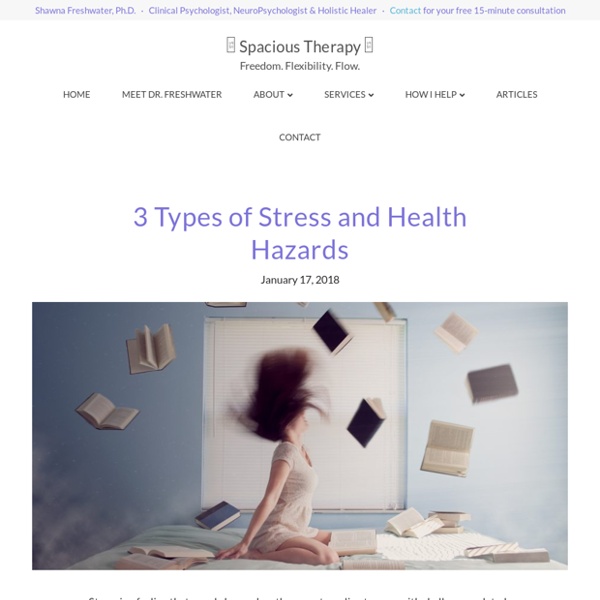Coping with stress at work?
Everyone who has ever held a job has, at some point, felt the pressure of work-related stress. Any job can have stressful elements, even if you love what you do. In the short-term, you may experience pressure to meet a deadline or to fulfill a challenging obligation. But when work stress becomes chronic, it can be overwhelming — and harmful to both physical and emotional health.
Stress vs Depression - Do You Know the Difference? - Harley Therapy™ Blog
Some stress, caused by regular life challenges, is unavoidable. And while feeling nervous about a work presentation or frustrated by a parent teacher meeting gone wrong is not fun, nobody would compare it to the challenge that is depression. Severe stress, however, is a different story.
Stress effects on the body
Musculoskeletal system When the body is stressed, muscles tense up. Muscle tension is almost a reflex reaction to stress — the body's way of guarding against injury and pain. With sudden onset stress, the muscles tense up all at once, and then release their tension when the stress passes.
What is Stress? - The American Institute of Stress
Stress is not a useful term for scientists because it is such a highly subjective phenomenon that it defies definition. And if you can’t define stress, how can you possibly measure it? The term “stress”, as it is currently used was coined by Hans Selye in 1936, who defined it as “the non-specific response of the body to any demand for change”. Selye had noted in numerous experiments that laboratory animals subjected to acute but different noxious physical and emotional stimuli (blaring light, deafening noise, extremes of heat or cold, perpetual frustration) all exhibited the same pathologic changes of stomach ulcerations, shrinkage of lymphoid tissue and enlargement of the adrenals. He later demonstrated that persistent stress could cause these animals to develop various diseases similar to those seen in humans, such as heart attacks, stroke, kidney disease and rheumatoid arthritis.
Good Stress, Bad Stress?
Feeling stressed can feel perfectly normal, especially during exam time. You might notice that sometimes being stressed-out motivates you to focus on your work, yet at other times, you feel incredibly overwhelmed and can’t concentrate on anything. While stress affects everyone in different ways, there are two major types of stress: stress that’s beneficial and motivating — good stress — and stress that causes anxiety and even health problems — bad stress. Here’s more on the benefits and side effects of stress and how to tell if you’re experiencing too much stress.
16 Simple Ways to Relieve Stress and Anxiety
Stress and anxiety are common experiences for most people. In fact, 70% of adults in the US say they feel stress or anxiety daily. Here are 16 simple ways to relieve stress and anxiety. Exercise is one of the most important things you can do to combat stress.
Under pressure at home and in school, youths battle depression
SINGAPORE: Even in preschool, Jodee Kua was picked on “quite a bit” by her classmates. And it did not take much, like stealing her seat or making fun of her, to make her burst into tears. “It was easy to just push that button,” said Ms Kua, now 21.
The Effects of Stress on Your Body
You’re sitting in traffic, late for an important meeting, watching the minutes tick away. Your hypothalamus, a tiny control tower in your brain, decides to send out the order: Send in the stress hormones! These stress hormones are the same ones that trigger your body’s “fight or flight” response. Your heart races, your breath quickens, and your muscles ready for action. This response was designed to protect your body in an emergency by preparing you to react quickly.
Work-related burnout is real in Singapore
SINGAPORE: One day at work, Ms Jamuna Raj was striking off “to-dos” from a neat hand-written list, thinking she had a lid on all her tasks at work. But the next day, she was bawling when her boss asked her if she was okay. The 31-year-old, who was handling multiple roles in client management, events, editorial management and production in a small publishing house, did not know what sparked it, but it was the start of her journey towards realising that she was experiencing burnout.



